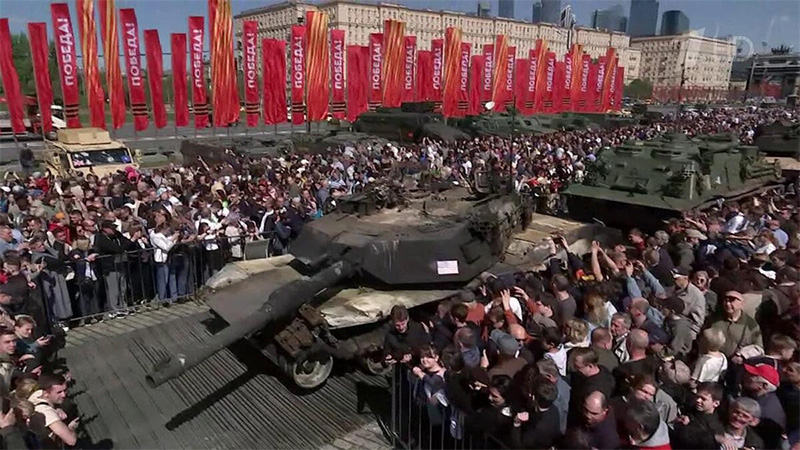A huge number of people come to the exhibition in Moscow.
US and NATO military equipment captured in Ukraine.
Photo: VK
Russians are learning to live with the war in Ukraine. The Kremlin is using Europe’s biggest conflict since World War II to reshape Russia, combining strident nationalism involving a potent mix of Soviet-era and imperial nostalgia with an intensifying crackdown on traitors.
As a result, Putin faces little domestic pressure to end the fighting, posing a challenge for Ukraine’s US and European allies as they seek to raise the cost for Russia of continuing the war that’s now in its third year, Bloomberg surprises.
The war has permeated every level of Russian society. In many schools, children send gifts and letters to frontline soldiers, and attend special lessons where teachers drum home the Kremlin’s message that the country is at war with the West in Ukraine.
TV and radio shows are often filled with war themes, casting those fighting in Ukraine as successors of the generation that defeated the Nazi German invasion in the “Great Patriotic War,”
Army recruitment campaigns offer lucrative signing bonuses and salaries for those who’ll “be a man” and join up as contract soldiers.
Platon Mamatov, 41, signed a contract in April to return to Ukraine after spending six months at the front last year. He said people in his native Urals city of Ekaterinburg often approach him to offer help and support when they see him in uniform. There’s been a “consolidation of society” behind the army, he said.
“Everyone realized that this is a war and that it concerns everyone,” he said. “Border territories are shelled daily, factories are burning inside Russia, drones are flying, funerals and disabled people are coming back from the front.”
Putin declared his intention to form a new political and business elite from those “who have proved their loyalty to Russia” in the war shortly before he gained a fifth term with a record 87% in the March presidential election. The Kremlin presented the pre-determined election in which he faced no real competition as evidence the public fully supports Putin’s showdown with the West.
Sanctions failed “to create enough economic discomfort at the personal level, to expose to Russians the link between the wars they launch and the erosion of their own wellbeing,” said Maria Snegovaya, senior fellow with the Europe, Russia, and Eurasia Program at the Washington-based Center for Strategic and International Studies. The impact on Russians’ living standards is “too small to radically change the public mood,” she said.
Indeed, as Russia adjusted to the unprecedented sanctions that failed to collapse its economy, many Russians found a financial upside to the war.
Russia’s economy is growing strongly for now as the government pours money into the defense industry and seeks to shield domestic businesses from the impact of sanctions. The Kremlin continues to reap income from oil and gas sales, pivoting to countries such as India and China after Europe shunned Russian energy.
Polls show public support for Putin remains high, with 87% approving of his leadership and 76% backing Russia’s army in Ukraine in a March survey.
Mamatov, a former political strategist, said he collects money from Russians through a Telegram channel to buy items like drones, bulletproof vests and medicines for frontline troops. Donations grow bigger every month, he said, because people understand this is “our common war.”
 The American Abrams, which is considered the “best weapon”.
The American Abrams, which is considered the “best weapon”.
Photo: VK
read more in our Telegram-channel https://t.me/The_International_Affairs

 9:46 09.05.2024 •
9:46 09.05.2024 •























